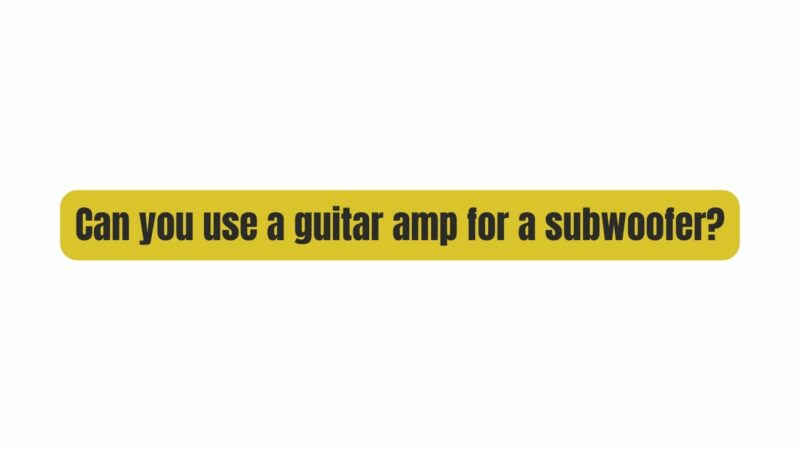Subwoofers are the unsung heroes of audio systems, responsible for delivering the deep, rumbling bass that adds power and depth to music, movies, and gaming experiences. But what if you find yourself in a situation where you have a guitar amplifier on hand and wonder, can you use a guitar amp for a subwoofer? In this comprehensive article, we will explore the possibilities, challenges, and considerations of using a guitar amplifier to power a subwoofer.
Understanding Guitar Amplifiers and Subwoofers
Before delving into whether a guitar amplifier can serve as a subwoofer amplifier, it’s essential to have a fundamental understanding of both components.
- Guitar Amplifiers: Guitar amplifiers are electronic devices designed to amplify the sound of an electric guitar. They consist of preamp and power amp sections and are tailored to reproduce the mid-range frequencies associated with the guitar’s tone. Guitar amplifiers often have dedicated controls for gain, tone shaping, and effects.
- Subwoofers: Subwoofers are specialized loudspeakers designed to reproduce low-frequency bass sounds, typically those below 100 Hz. They are responsible for providing the deep, resonant, and impactful bass that enhances audio playback.
Can You Use a Guitar Amplifier for a Subwoofer?
The concept of using a guitar amplifier for a subwoofer is feasible, but it comes with several considerations and potential challenges. Let’s explore the possibilities:
1. Power Output
One of the primary considerations when using a guitar amplifier for a subwoofer is power output. Subwoofers require a substantial amount of power to produce deep and impactful bass. Guitar amplifiers are designed for mid-range frequencies and may not deliver the necessary power for subwoofer applications.
- Guitar Amplifier Power: Guitar amplifiers are typically rated in watts and are optimized for the frequency range of the electric guitar. While some guitar amps have a power amp section capable of driving subwoofers, the majority may lack the power required for authoritative bass.
2. Frequency Response
Guitar amplifiers are tailored to reproduce the mid-range frequencies associated with guitar tones. They are not optimized for handling the low-frequency bass sounds that subwoofers excel at reproducing. Using a guitar amp for a subwoofer may result in an imbalanced and inadequate bass response.
3. Impedance Matching
Impedance, measured in ohms (Ω), is an essential consideration for amplifier-subwoofer compatibility. Both the guitar amplifier and the subwoofer should have matching impedance ratings to ensure efficient power transfer.
- Guitar Amplifier Impedance: Guitar amplifiers typically have an output impedance that matches standard guitar speakers, which is commonly 4Ω, 8Ω, or 16Ω. Subwoofers may have varying impedance ratings, so it’s crucial to verify compatibility.
4. Crossover and Filtering
Subwoofers require precise frequency management to reproduce bass accurately. This includes the use of a low-pass filter to direct only the bass frequencies to the subwoofer. Guitar amplifiers may not have built-in filters or crossovers suitable for subwoofer applications, potentially leading to distortion and compromised sound quality.
5. Sound Quality
While it is technically possible to use a guitar amplifier for a subwoofer, it may not offer the same level of control and sound quality optimization as a dedicated subwoofer amplifier. Subwoofer amplifiers often come equipped with advanced features such as adjustable phase control, parametric EQ, and precise tuning options, allowing for precise tailoring of the subwoofer’s performance.
6. Application Considerations
The suitability of using a guitar amplifier for a subwoofer can vary depending on the specific application:
- Home Use: In a home audio setup, using a guitar amplifier for a subwoofer may be less practical due to potential limitations in power and frequency response. Home theater enthusiasts and audiophiles often prefer dedicated subwoofer amplifiers for precise bass control.
- DIY or Temporary Solutions: In DIY audio projects or temporary setups where budget constraints are a concern, using a guitar amplifier for a subwoofer can be a creative solution. However, it may require careful calibration and adjustment to optimize performance.
- Live Sound: In live sound reinforcement scenarios, using a guitar amplifier for subwoofer applications is generally discouraged due to potential power limitations and an imbalanced frequency response.
Conclusion
In conclusion, while it is technically possible to use a guitar amplifier for a subwoofer, it is not the most practical or optimal choice. Guitar amplifiers are designed for mid-range frequencies and may lack the power, frequency response, and necessary filtering to drive a subwoofer effectively.
Dedicated subwoofer amplifiers offer advantages in terms of power, control, and sound quality optimization, making them the preferred choice for audiophiles and home theater enthusiasts seeking the best bass performance. In scenarios where a guitar amplifier is the only option, careful consideration of power output, impedance matching, and frequency management is essential to achieve the best possible results.
Ultimately, the decision to use a guitar amplifier for a subwoofer should align with your specific audio system, requirements, and limitations. By understanding the capabilities and challenges of this unconventional approach, you can make an informed choice that ensures your subwoofer delivers the deep, impactful bass that enhances your audio experience.


